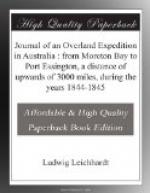The black cockatoo (Calyptorhynchus Banksii) has been much more frequently observed of late.
We used the last of our salt at the last camp; and what we should do without it, was a question of considerable interest. As I had never taken salt with me in my reconnoitring expeditions, and had never felt the want of it with dried beef, either grilled or raw, I recommended my companions to eat their meat in the same state; and, in fact, good dry beef, without any farther preparation, was much relished by all of us: for, when grilled, it became ashy and burnt, particularly when without fat; and, if stewed, although it yielded a good broth, it became tough and tasteless. The meat of the last bullock was very hard and juiceless, and something was to be done to soften it, and make it palatable: as we had no fat, we frequently steamed it with water, but this rendered it tough, without facilitating in the least the mastication; and its fibres, entering between our teeth, rendered them exceedingly tender, and caused us much pain. After a week’s trial, and several experiments, we returned to our former practice of stewing it, and in a very short time relished it as much without salt, as we had formerly done with it.
CHAPTER IX
The starry heavens—substitute for coffee—sawfish—two-storied
gunyas
of the natives—the
Mitchell—Murphy’s pony
poisoned—green
tree-ant—new beverage—crocodile—audacity
of kites—natives not
friendly—the camp attacked
at night by them—Messrs.
Roper and Calvert
wounded, and Mr. Gilbert killed.
June 1.—Mr. Gilbert and Charley made an excursion down the river last night, to look for water, but, as they did not return in the morning, and as water had been found, after they left, about four miles lower down, we started to meet them. Observing a swarm of white cranes circling in the air, and taking their flight down the river, I concluded that we should meet with a good supply of water lower down, and, therefore, passed the nearest water-hole; but, the country and the bed of the river being exceedingly rocky, our progress was very slow. After proceeding about eight miles, we came to the junction of a river from the south-west with the Lynd; and encamped at some small pools of water in latitude 17 degrees 45 minutes 40 seconds: having travelled, during the last two stages, in a west-north-west direction.




